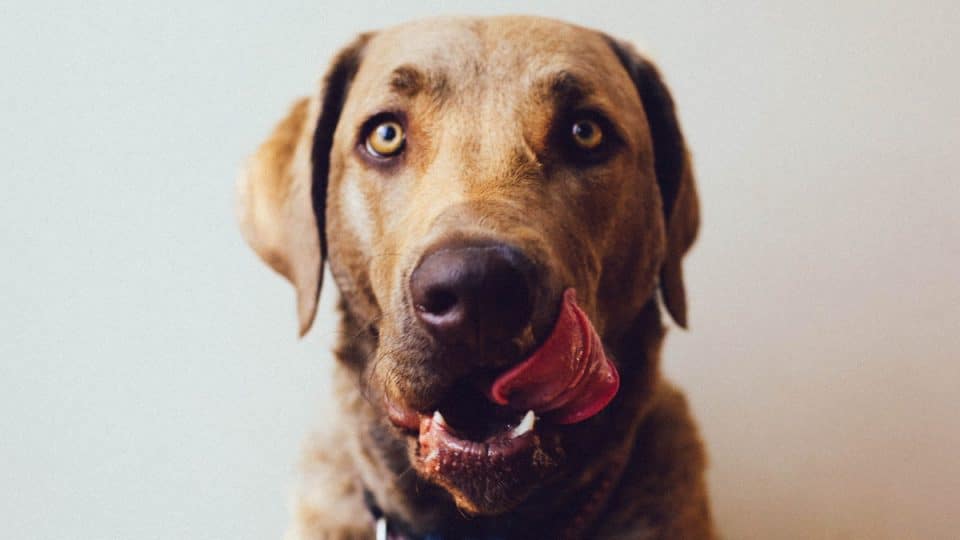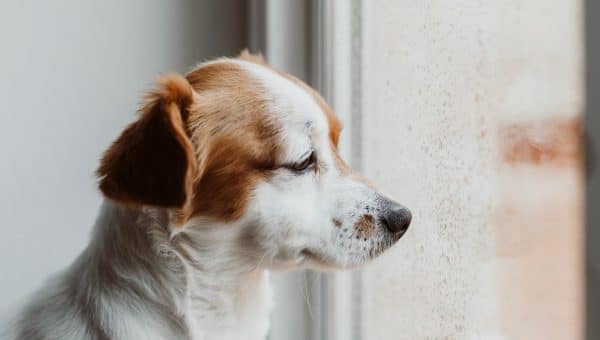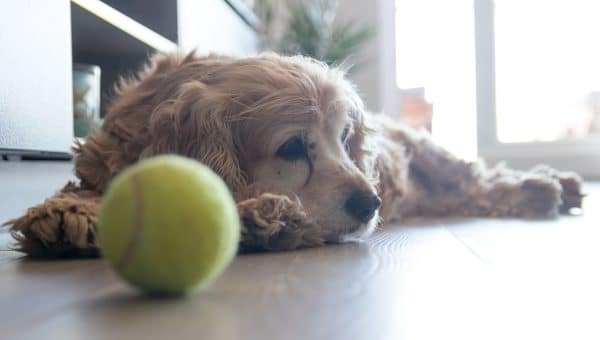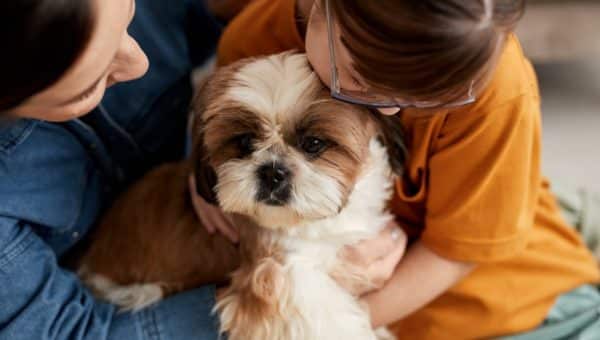- Not a substitute for professional veterinary help.
If you’re a dog parent, you’ve surely noticed your pup has some peculiar habits! One of these is licking and smacking their lips. But just why do dogs smack their lips?
We spoke with nationally recognized expert Dr. Jamie Whittenburg (DVM), veterinarian director at Senior Tail Waggers, to help us get to the bottom of this curious canine habit. She explained that often dogs smack their lips because of nausea, dental, or oral issues. That’s because when a dog is nauseated, regardless of the reason, they will commonly hypersalivate and smack their lips. Infected teeth, gingivitis, ulcerations, injuries, and masses or foreign material in the mouth are also common causes of lip smacking.
Below, we explore in more depth nine of the most common reasons for lip smacking in dogs.
1. Your Dog Is Ready To Eat Or Just Ate
Is your dog hungry? Your dog might be licking or smacking their lips in anticipation. But why? Dogs produce excess saliva when expecting food, and licking or smacking their lips will help get rid of the excessive drool before they start to chow down. This may also last a little while after they’ve finished eating.
In fact, the famous Pavlov’s dogs study demonstrates that dogs are conditioned to salivate when there’s any indication food is coming—not just when their food is put in front of them, but when they hear you open the cupboard or tear the wrapper on a treat packet.
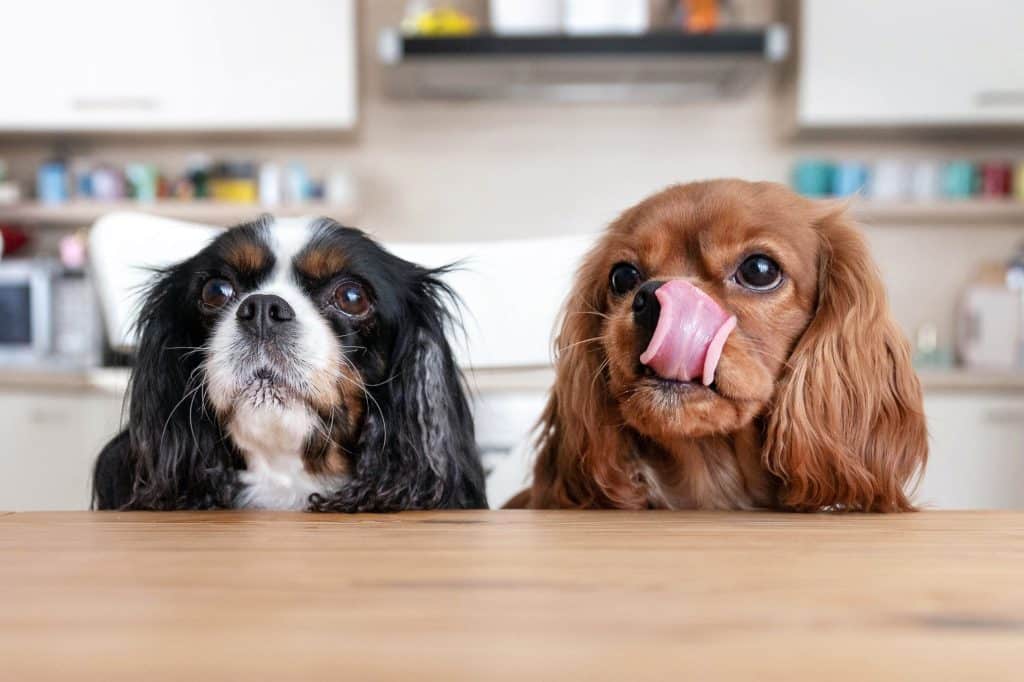
iStock/fotyma
2. Your Dog Is Feeling Nauseous
When dogs are sick and about to vomit, they produce extra saliva that lubricates their mouth and throat in preparation. This means your dog might smack their lips to control the excess saliva being produced.
There are many reasons your dog might vomit, and some are more serious than others. These can include:
- Infections like parvovirus
- Worms
- Gastroenteritis or gastritis
- Travel sickness
- Food poisoning
- Reaction to medications
- Food allergies
- Diabetes
While you don’t always need to take your dog to the vet if they’re throwing up, you should look for signs that it’s more serious. For example, if your dog has been sick for more than 24 hours, is lethargic/very sleepy, has blood spots in their vomit, is disorientated, or has other associated medical conditions, then contact your vet right away.
3. Your Dog Has Something Stuck In Their Mouth
Your dog might be excessively drooling and smacking their lips because they have something stuck in their mouth. This extra drool is to help lubricate the mouth to avoid injury and help flush the foreign object out.
Common things that could get stuck in your dogs mouth are:
- Sticks/pieces of broken stick
- Toys they’ve chewed up
- Bone shards
So, should you remove something from your dog’s mouth that’s stuck? No. If there’s something stuck in your dog’s throat, take them to a vet immediately.
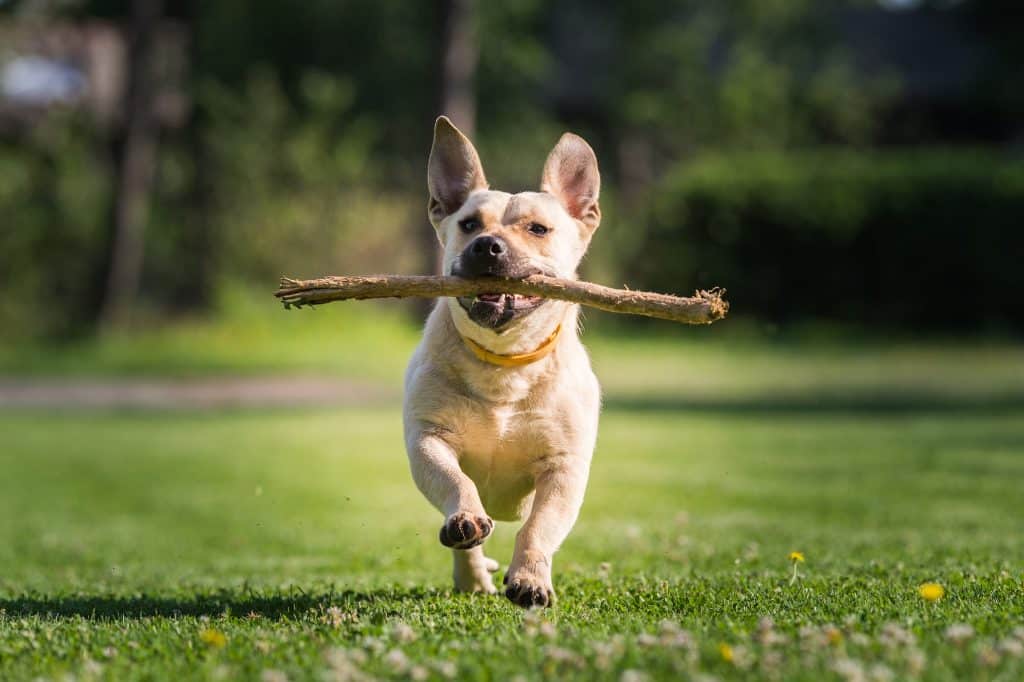
iStock/fotokostic
4. Your Dog Is Sick
There are also various health conditions that could induce lip smacking. These can include:
- Kidney disease. You might see lip smacking in dogs with kidney disease, as it can cause nausea, dehydration, and oral ulcers that cause excess or thickened saliva.
- Liver disease. Similarly, liver disease can cause nausea and dehydration, leading to excess or thickened saliva and lip smacking. Dr. Whittenburg explained that when toxins are not filtered and accumulate in the blood, this can lead to nausea and lip smacking too.
- Nervous system disease. If your dog has a nervous system disease, they may lick to soothe themselves. That’s because the act of licking actually releases endorphins, making your dog feel better. While nervous system disease is a broad term, Dr. Whittenburg mentioned that issues with the nervous system can often result in abnormal movements, including lip smacking.
- Seizures. Lip smacking in dogs can be a sign of partial seizures affecting only small parts of the brain. Other seizure indicators include biting at the air, repeatedly kicking out one leg, or other sporadic movements specific to just one part of the body.
- Orthopedic disease. Though uncommon, if your dog is in pain, they might develop a lip smacking habit to soothe themselves. Perhaps your dog limps or yelps when you touch them in a certain place? Then they might have pain in their bones or joints and looking for a little relief.
If you suspect any of these diseases in your dog, please take them to the vet. They can assess the problem and provide any necessary treatment.
5. Your Dog Has Mouth Pain
When your dog has mouth pain, they usually produce excess saliva, leading to lip smacking. This is because saliva has healing properties and is used to keep the mouth lubricated and more comfortable when something is sore. There are many reasons your dog could have pain in their mouth. However, it’s most often due to poor dental health. Additionally, your dog might have a broken tooth, gum disease, an abscess, or even jaw cancer.
However, some dogs are just more prone to getting dental problems that cause lip smacking than others. And if you have one of these breeds, it’s extra important to keep on top of your dog’s oral hygiene!
- Brachycephalic breeds. These dogs have small squashed noses that make them prone to gum disease. That’s because these dogs can suffer from overcrowding in their small mouths, trapping food and causing a buildup of bacteria. Pugs, Shih Tzus, Boston Terriers, and Bulldogs are all examples of brachycephalic breeds.
- Larger breeds. Big dog? Big gums! Larger dogs like Great Danes, Boxers, and Mastiffs are also prone to overgrown gums. This is called gingival hyperplasia and happens when there is an excessive buildup of plaque.
- Dachshunds. These long but short dogs also have a long but small snout! That makes them more likely to develop periodontal pockets, where the gum tissue breaks away from the tooth leading to decay.
The best way to prevent dental problems in your dog is with regular tooth brushing. But if you’re worried about any problems your dog already has, be sure to take them to the vet for a dental checkup. Just like in humans, regular dental appointments are important in dogs. Your vet will also be able to help you out with the right dental products to use for your dog. No human toothpaste allowed!
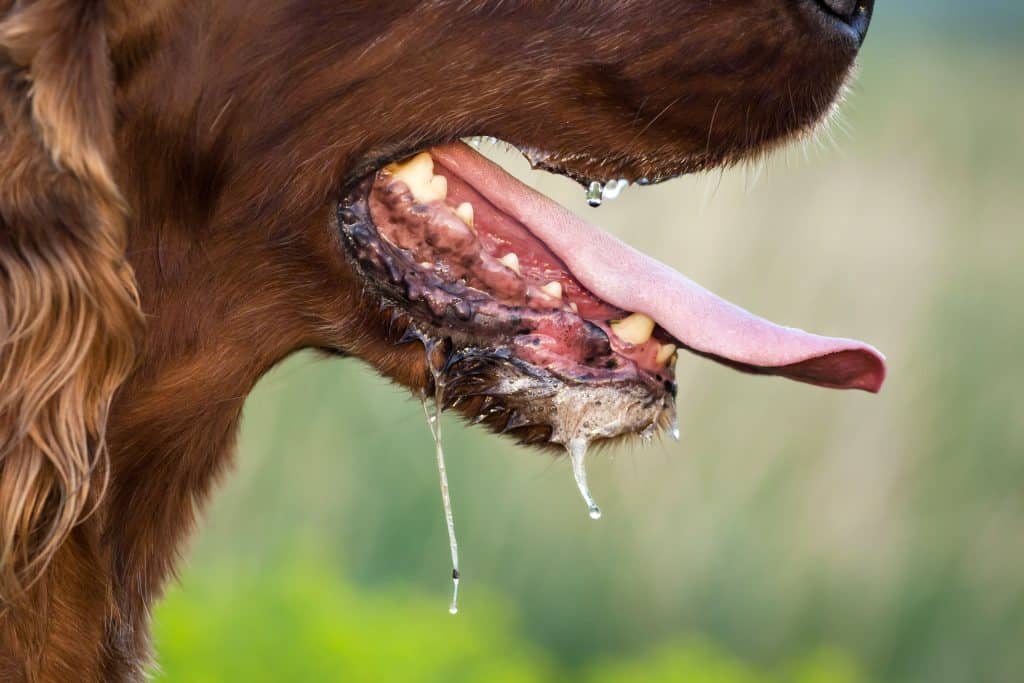
iStock/Wavetop
What about lip smacking if my puppy is teething?
If you have a teething puppy, their gums will be sore and tender. So they might smack and lick their lips to help relieve some of that pain. Puppies generally begin teething at 5 to 6 weeks old. And then at around 12 to 16 weeks, their baby teeth will start to fall out to make room for the adult ones. By eight months old, these adult teeth should be fully grown.
However, keep in mind that if your puppy has developed a lip smacking habit, the cause could go deeper than teething.
Dr. Whittenburg points out that while there is a definite increase in chewing behavior and overall mouth play in teething puppies, lip smacking in a young puppy shouldn’t be ignored. Puppies are at high risk for parvovirus, as well as obstructions from ingesting foreign material. And these maladies must be diagnosed and treated rapidly to avoid becoming fatal.
6. Your Dog Wants Attention
Dogs love getting attention from their favorite person. And they’ll do just about anything to get it! If your dog notices you give them attention or food when they smack their lips, they’ll learn it as a behavior.
Other things your dog might do to get your attention are jumping up, pawing, barking, dropping things in front of you, nipping at you, or stealing things to make you chase them. You can train your dog to avoid these behaviors by rewarding good behaviors like being calm and sitting nicely.
7. Your Dog Has A Salivary Gland Problem
Dogs might also smack and lick their lips with certain salivary gland disorders, including:
- Sialadenosis. A rare disease where the salivary glands become enlarged. Other symptoms can include gulping, retching, vomiting, snorting, depression, loss of appetite, and weight loss.
- Neoplasias. A condition that almost exclusively affects older dogs. Oral neoplasias are invasive tumors in the glandular tissue that grow rapidly. Other symptoms can include difficulty eating, bleeding from the mouth/nose, swelling, sudden weight change, diarrhea, and vomiting.
- Mucoceles. Salivary mucoceles are where there’s a build-up of saliva in subcutaneous tissues when the salivary glands have been damaged. Other symptoms can include swelling, pain, bleeding, respiratory distress, and light brown/bloody saliva.
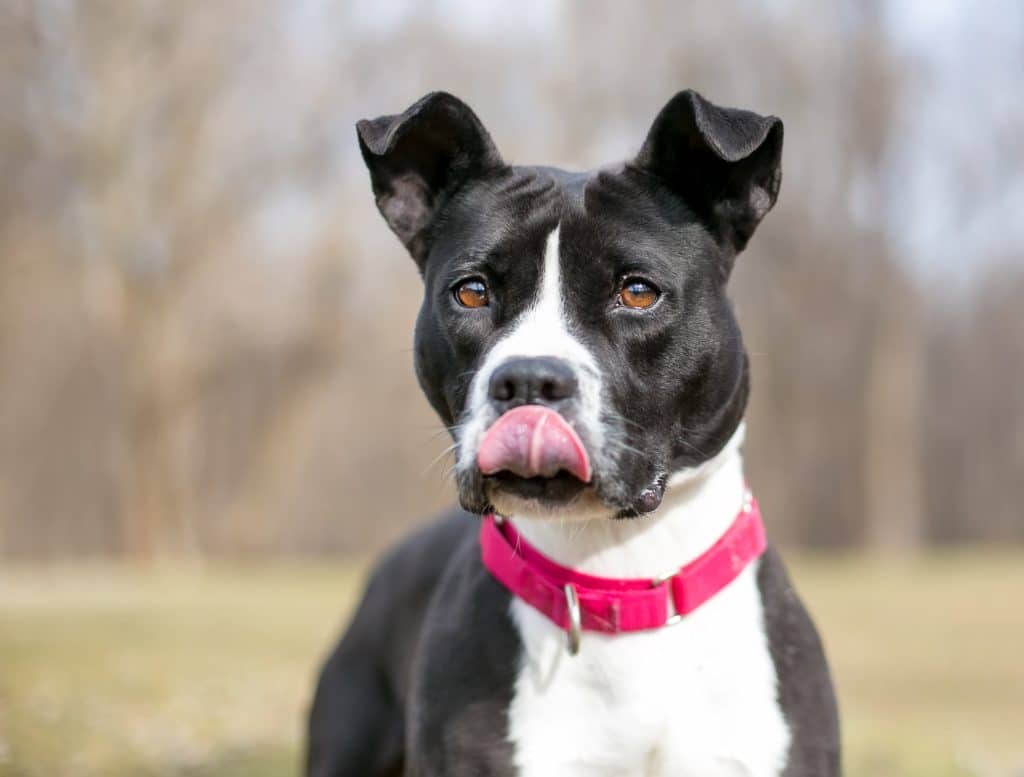
iStock/Mary Swift
8. Your Dog Has Dry Mouth Or Is Dehydrated
When your dog is dehydrated or has dry mouth their saliva will thicken due to the lack of liquid. This can be uncomfortable for your dog and cause them to smack or lip their lips more often.
Signs your dog has dry mouth can include:
- Excessive panting
- Dry eyes, nose, and/or gums
- Lethargy/low energy
- Decreased or loss of appetite
- Slow response time
- Dry, sunken eyes
- Less frequent urination
- Dark urine color
- General weakness, especially when trying to walk
- Loss in skin elasticity
9. Your Dog Is Stressed Or Anxious
Dogs can smack or lick their lips because they are experiencing anxiety. That’s because in dogs, licking produces endorphins creating a calming effect. Other self-soothing behaviors (also known as calming signals) that dogs can display include:
- Head turning. Your dog might turn their head from side to side or hold it in one direction. This can also signal to approaching dogs to calm down, or show that they are uncomfortable with a situation.
- “Softening” the eyes. Dogs make their eyes look more friendly to show they are not threatening.
- Body turning. When playing, dogs may turn their side or backs to you or other dogs to calm down or take a quick breather. They may also do this when someone or a dog acts aggressively toward them.
- Freezing. Dogs may sit or stand completely still to diffuse a situation or show a lack of threat.
- Yawning. This might seem like an odd one! But dogs also yawn in uncomfortable situations—at the vet’s surgery for instance—to help feel less stressed.

iStock/megaflopp
When To See A Vet For Lip Smacking
As we’ve discussed above, some of the reasons for your dog’s lip smacking can be more serious than others. And sometimes you might need to book in to see your normal vet or an emergency vet ASAP. Dr. Whittenburg says some of the general symptoms indicating a more serious problem include:
- Rapid weight loss
- Lethargy
- Nasal discharge
- Persistent vomiting or diarrhea
- Abnormal lip smacking for more than 24 hours
- Breathing difficulties or increased respiratory effort at rest
- Foul smell coming from the mouth
- Reluctance to eat for more than 24 hours
- Displaying signs of pain in their mouth or abdomen
- Pawing at the mouth or an object or mass is seen in the mouth
In these cases, Dr. Whittenburg advises you to see a vet pronto. But if your dog doesn’t have these symptoms and you’re still concerned, the vet is always there to help. After all, it’s better to be safe than sorry where your dog is concerned!
